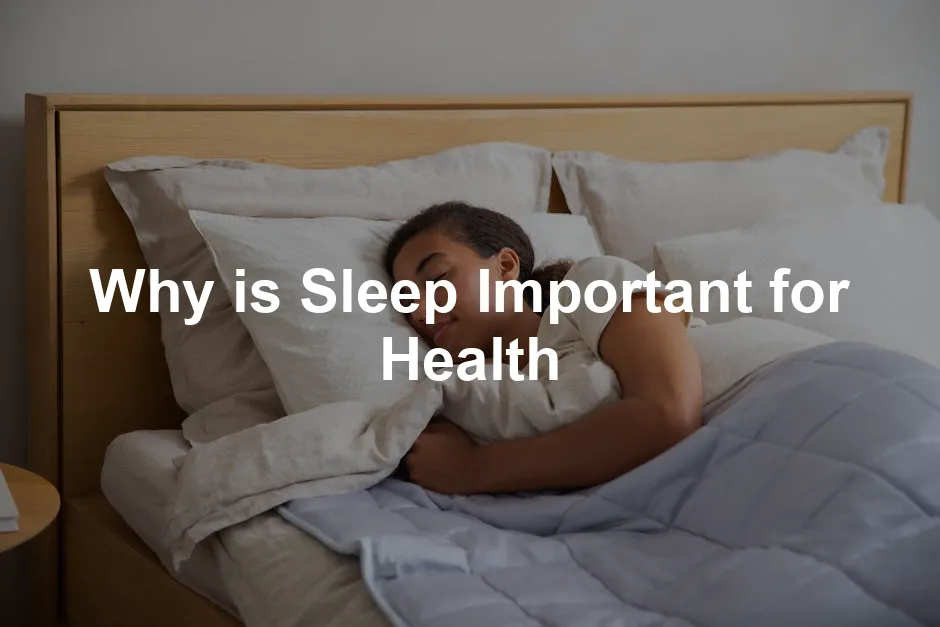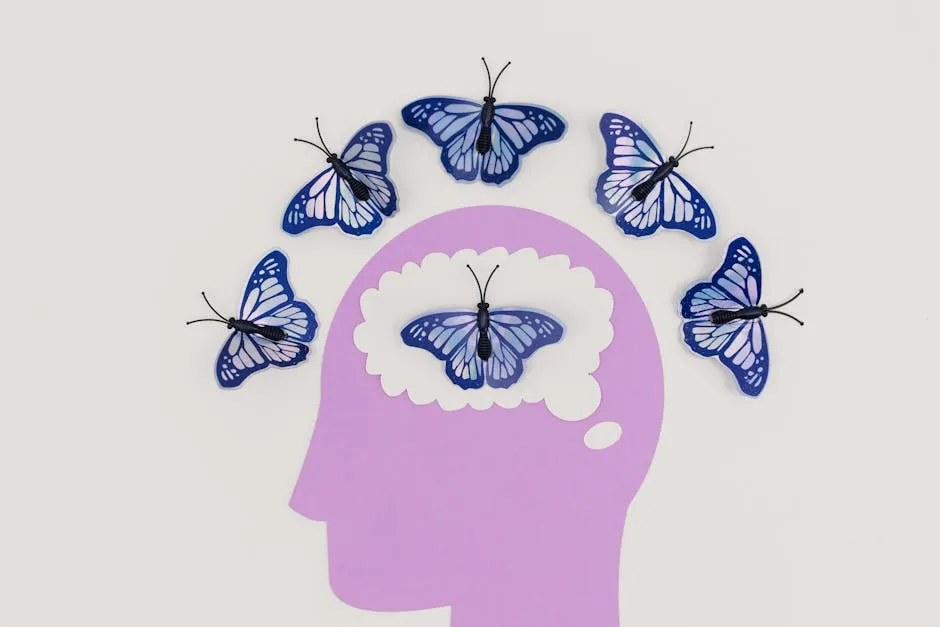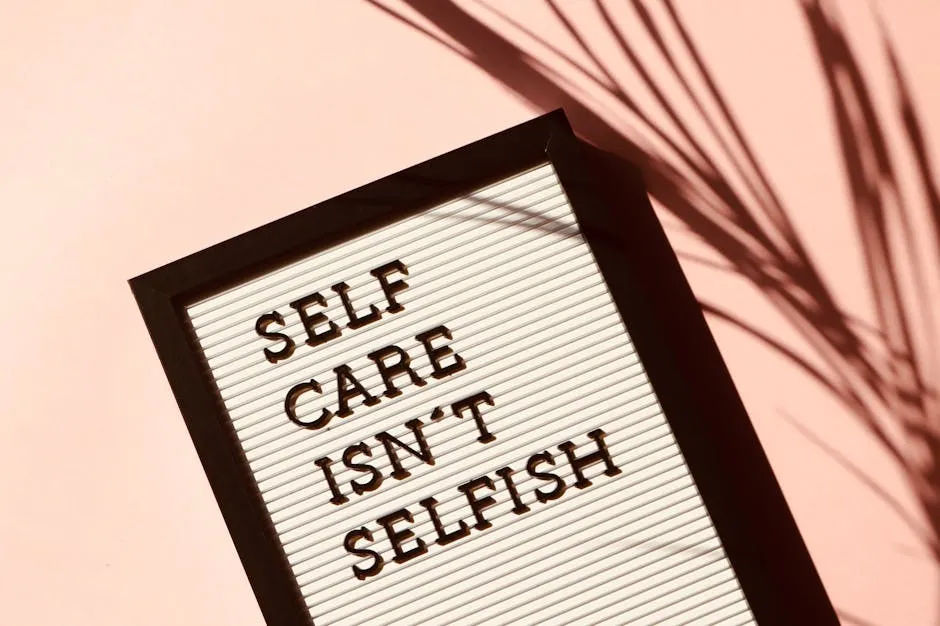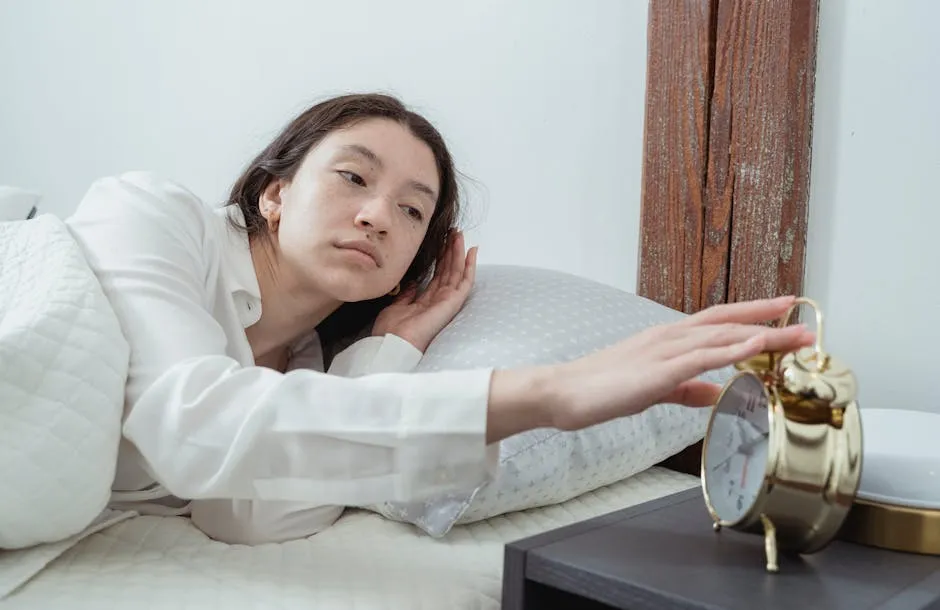
Why is Sleep Important for Health
Introduction
Sleep is a fundamental pillar of health, right alongside diet and exercise. It’s that magical time when our bodies and minds hit the reset button. However, in our fast-paced modern lives, sleep often takes a backseat. Between juggling work, family, and those never-ending “just one more episode” moments, many of us are riding the sleep deprivation train. And let me tell you, it’s not a fun ride.
Research shows that chronic sleep deprivation can lead to a host of health issues, from heart disease to depression. It’s a serious matter that deserves our attention. This article dives into why sleep is not just a luxury but a necessity for our health and well-being. Buckle up, because we’re about to unravel the mysteries behind those precious Zs!

Understanding Sleep
What is Sleep?
Sleep is not merely a passive state; it’s an intricate process that significantly affects our physical and mental health. Defined as an altered state of consciousness, sleep involves limited interaction with the surroundings. During this time, our brain is anything but idle. In fact, it’s working hard to support various physiological and psychological functions. From processing information to regulating emotions, sleep plays a critical role in how we function daily. Without it, our bodies struggle to maintain balance, leading to a cascade of health issues.
To enhance your sleep experience, consider using a 3D Contoured Eye Mask. This nifty little gadget comfortably molds to the shape of your face, blocking out light and helping you drift off into a peaceful slumber. Trust me, your sleep-deprived self will thank you!

Stages of Sleep
The sleep cycle consists of several stages, primarily categorized into NREM (non-rapid eye movement) and REM (rapid eye movement) sleep. Each stage plays a unique role in our overall health.
- NREM Sleep: This includes stages 1 through 3. Initially, you drift into light sleep, but as you progress, your body enters deep sleep. This stage is crucial for physical repair, immune function, and growth hormone release. It’s the body’s time to mend and rejuvenate.
- REM Sleep: Occurring about 90 minutes after falling asleep, REM sleep is when most dreaming happens. It’s vital for memory consolidation and emotional regulation. This stage helps your brain process experiences from the day, turning fleeting moments into lasting memories.
Together, these stages create a cycle that’s essential for memory consolidation, emotional stability, and physical recovery. So, the next time you hit snooze, remember: you’re not just avoiding morning traffic; you’re investing in your health!

The Health Benefits of Sleep
Cognitive Function and Memory
Sleep does wonders for your brain. It’s like a nightly power-up for your mental abilities. Studies show that a good night’s sleep enhances learning and memory processing. When you sleep, your brain consolidates information from the day, making it easier to recall later. It’s like saving a document on your computer; without sleep, all that effort could end up unsaved.
However, the opposite happens when you skimp on sleep. Research links sleep deprivation to poor decision-making and memory lapses. Take a 2017 study, for instance; it revealed that sleep-deprived individuals had significant difficulty concentrating and processing information. Imagine trying to remember where you left your keys while running on three hours of sleep—chaotic, right? Lack of sleep impairs cognitive function, making it harder to think clearly and make sound judgments. So, if you want to ace that exam or nail that presentation, prioritize your Zs!

If you find yourself tossing and turning, consider adding a Sleep Journal to your routine. Tracking your sleep patterns can help you identify what works and what doesn’t, leading to more restful nights!
Physical Health
Let’s talk about your body. Sleep is vital for physical health, impacting several conditions. For a deeper understanding of why sleep is important for health, you can explore the detailed insights on this topic.
Understanding the importance of sleep can help you appreciate its role in maintaining your health. why is sleep important for health
- Heart Health: Inadequate sleep increases the risk of heart disease and hypertension. A study found that people who sleep less than seven hours a night are more likely to develop cardiovascular problems. Think of sleep as a protective shield for your heart. When you neglect it, you’re leaving yourself vulnerable.
- Weight Management: If you’re battling the bulge, you might want to look at your sleep habits. Research suggests that insufficient sleep is linked to a higher risk of obesity. A 2018 study indicated that people who sleep less than seven hours daily often struggle with weight management. Sleep deprivation messes with hormones that control hunger, leading to cravings for those tempting high-calorie snacks.
- Immune Function: Your immune system is no different. It thrives on sleep! Adequate rest supports immune efficiency and recovery. Studies show that sleep-deprived individuals are more likely to catch colds and other infections. When you sleep, your body produces cytokines, proteins essential for fighting off infections. Skimp on sleep, and you risk becoming the next victim of the sniffles.

To help with sleep quality, consider investing in a Weighted Blanket. These cozy wonders can help you feel more secure and calm, improving your overall sleep experience.
Mental Health
Sleep is a powerhouse for mental health. A lack of sleep is strongly linked to anxiety and depression. Research shows that individuals with sleep disorders often report higher levels of stress and emotional instability. It’s like trying to balance on a seesaw that’s tilted—one little push can send you tumbling.
Moreover, poor sleep can exacerbate existing mental health conditions. If you’re already dealing with anxiety or depression, inadequate sleep can amplify those feelings, making it harder to cope. A meta-analysis in 2016 found a significant association between insomnia and increased depression risk. You might think, “If I can just power through it,” but without enough sleep, you’re essentially handing the wheel over to your mental health issues.
In conclusion, sleep is not just a luxury; it’s a fundamental necessity for cognitive function, physical health, and mental well-being. Prioritizing sleep can significantly improve your quality of life, ensuring you wake up ready to tackle whatever the day throws at you. So, don’t underestimate the power of a good night’s sleep—it’s your best ally for a healthier, happier life!

Recommended Sleep Duration
Sleep Needs by Age Group
Sleep isn’t a one-size-fits-all deal; it varies by age. Here’s a quick rundown on how much sleep different age groups typically need:
- Newborns (0-3 months): They need a whopping 14-17 hours a day. Yes, they’re basically professional sleepers!
- Infants (4-12 months): Expect around 12-16 hours, which includes those delightful daytime naps.
- Toddlers (1-2 years): These little explorers require about 11-14 hours, plus a nap or two.
- Preschoolers (3-5 years): Aim for 10-13 hours a night, as they’re busy growing and learning.
- School-age children (6-12 years): They should be getting 9-12 hours of sleep to keep those brains sharp.
- Teens (13-18 years): Roughly 8-10 hours is ideal, as they’re navigating school, social lives, and hormones.
- Adults (18-64 years): Most need at least 7 hours, but let’s be honest, many of us hope for more.
- Older Adults (65+ years): Around 7-8 hours will do, although sleep patterns may shift.

Individual sleep needs can vary based on lifestyle, health, and personal habits. Active individuals or those under stress may need extra Zs. So, don’t be surprised if you feel like you could use a nap after a particularly hectic week!
Impact of Sleep Quality vs. Quantity
Now, let’s not forget that it’s not just about the number of hours you rack up. Quality matters too! You can sleep for 8 hours and still wake up feeling like a zombie if your sleep is riddled with interruptions.
Quality sleep means you’re getting uninterrupted, refreshing rest. This type of sleep is crucial for brain function, emotional stability, and overall health. Unfortunately, many face common sleep disorders like insomnia or sleep apnea, which can turn a cozy bed into a battleground.
Insomnia makes it tough to either fall asleep or stay asleep. Meanwhile, sleep apnea causes your breathing to pause during sleep, leading to snoring, gasping, and a not-so-great night. Both of these disrupt sleep quality and can leave you feeling groggy and irritable. So, if you wake up tired, it might be time to evaluate not just how long you sleep but how well you sleep.

The Consequences of Sleep Deprivation
Short-term Effects
Sleep deprivation isn’t just a minor inconvenience; it can lead to some serious short-term effects. Think of it as a double espresso shot of bad news for your body and mind.
First off, let’s talk about cognitive function. Lack of sleep can severely impair your ability to think straight. You know that feeling when you can’t remember where you parked your car? Imagine that, but with everything you do! Research shows that sleep-deprived individuals struggle with focus, concentration, and decision-making. It’s like trying to drive a car with a foggy windshield—dangerous and frustrating.
Mood disturbances? Oh, you bet! Sleep deprivation can turn even the sunniest disposition into a stormy cloud of irritability. Little things can feel catastrophic. Ever snapped at a loved one over a misplaced sock? Yeah, that’s sleep deprivation talking.
And let’s not forget the increased accident risk. Drowsy driving is a real hazard. In fact, the CDC reports that approximately 1 in 25 adults have fallen asleep at the wheel! That’s akin to driving under the influence. So, if you find yourself struggling to keep your eyes open, it might be time to consider the importance of catching those Zs.

In summary, short-term sleep deprivation can wreak havoc on your cognitive abilities, mood, and safety. Prioritizing sleep isn’t just a luxury; it’s a vital aspect of maintaining a healthy, functioning life. So make sleep a priority, and avoid the pitfalls of sleep deprivation—it’s a win-win for your health and happiness!
Long-term Health Risks
Sleep deprivation isn’t just a temporary nuisance; it’s a long-term health hazard. Chronic sleep issues can lead to serious conditions like diabetes, obesity, cardiovascular diseases, and mental health disorders. The numbers don’t lie—around 35% of adults in the U.S. report getting less than the recommended seven hours of sleep each night. This isn’t just a statistic; it’s a wake-up call!
Research indicates that people who consistently shortchange their sleep face a staggering 41% greater risk of developing obesity. Insufficient sleep messes with hormones responsible for hunger, leading to increased cravings, especially for high-calorie snacks. Talk about a double whammy!
Now, let’s talk about heart health. A study showed that sleeping fewer than seven hours per night boosts the risk of heart disease by 13%. That’s enough to make anyone reconsider their late-night Netflix binges. Your heart deserves better!
And what about diabetes? Chronic sleep deprivation can increase insulin resistance, a precursor to type 2 diabetes. A 2020 analysis found that sleeping less than five hours a night raised the risk of developing type 2 diabetes by a whopping 48%. It’s clear: sleep is essential for maintaining balanced blood sugar levels.

Mental health is also at stake. Studies show that individuals with sleep disorders are more likely to experience anxiety and depression. Poor sleep can exacerbate these conditions, creating a vicious cycle that’s tough to break.
So, before you brush off those late nights as no big deal, remember: your health might be paying the price. Prioritize quality sleep, and you’ll be investing in a healthier, happier future.
Tips for Improving Sleep Quality
Sleep Hygiene Practices
Let’s be real: improving sleep isn’t just about hitting the pillow. It’s about creating a sleep-friendly environment and routine. Here are some actionable tips to help you catch those Zs:
- Establish a Consistent Sleep Schedule: Go to bed and wake up at the same time daily, even on weekends. Your body loves routine, and this helps regulate your internal clock.
- Create a Conducive Sleep Environment: Aim for a dark, quiet, and cool room. Consider blackout curtains, earplugs, or a white noise machine. Your bedroom should be a sleep sanctuary, not a distraction zone!
- Limit Screen Time and Stimulating Activities Before Bed: The blue light from screens can mess with melatonin production. Try switching off devices at least an hour before bedtime. Instead, opt for relaxing activities like reading or meditation.

Lifestyle Changes
Diet and exercise play a vital role in sleep quality. Here’s how you can make impactful changes:
- Watch Your Diet: Avoid heavy meals, caffeine, and alcohol close to bedtime. Instead, consider a light snack if you’re feeling peckish. You might even want to sip on some Sleepy Time Tea for Relaxation to help calm your mind.
- Get Moving: Regular physical activity can help you fall asleep faster and enjoy deeper sleep. Just avoid vigorous exercise in the hours leading up to bedtime—save that for earlier in the day.
- Manage Stress: High stress levels can sabotage your sleep. Practice relaxation techniques like deep breathing, yoga, or journaling. Find what calms your mind and incorporate it into your nightly routine.
- Reduce Stimulants: Cut back on caffeine and nicotine, especially in the afternoon and evening. These stimulants can keep you wide awake when you should be winding down.

By implementing these tips, you can enhance your sleep quality and wake up feeling refreshed. Remember, good sleep is a crucial investment in your long-term health! And if you’re looking for a cozy addition to your nighttime routine, consider a Aromatherapy Diffuser to fill your space with calming scents.

FAQs
What are some common sleep disorders?
Sleep disorders can significantly impact overall health. Insomnia is one of the most common, characterized by difficulty falling or staying asleep. It can be short-term or chronic, often exacerbated by stress or anxiety. Sleep apnea is another prevalent disorder where breathing is interrupted during sleep, leading to snoring and gasping. This condition can be dangerous if left untreated. Lastly, restless legs syndrome causes uncomfortable sensations in the legs, often disrupting sleep. If you suspect you have a sleep disorder, consulting a healthcare professional is a wise move.
How can I tell if I’m getting enough sleep?
Recognizing signs of sleep deprivation is crucial. If you often feel tired during the day, struggle to concentrate, or find yourself irritable, you might not be getting enough rest. Other signs include relying on caffeine to stay awake or waking up frequently at night. If you consistently wake up feeling groggy, it’s time to reassess your sleep quality. Should these symptoms persist, it’s best to consult a healthcare provider for further evaluation.
Can I catch up on sleep during the weekends?
Ah, the weekend sleep catch-up! While it sounds tempting, research indicates that it’s not a foolproof solution. This concept, known as sleep debt, suggests that trying to recover lost sleep over the weekend can only partially offset the effects of a week of deprivation. In fact, studies show that both consistently sleep-deficient individuals and those who attempt to catch up on weekends may experience weight gain and worsened blood sugar control. So, let’s aim for consistency during the week instead!
Is it possible to sleep too much?
Yes, it is! While we often focus on the dangers of not getting enough sleep, oversleeping can also pose risks. Sleeping more than nine hours regularly may indicate underlying health issues, such as depression or sleep disorders. Excessive sleep has been linked to health problems like heart disease and diabetes. If you find yourself sleeping excessively yet still feel tired, it’s wise to consult a healthcare provider to rule out any underlying issues. Balancing sleep duration is key to maintaining good health.
Please let us know what you think about our content by leaving a comment down below!
Thank you for reading till here 🙂
All images from Pexels




